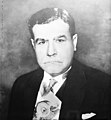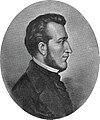The Honduras Portal
Republic of Honduras República de Honduras (Spanish) | |
|---|---|
Motto:
| |
| ISO 3166 code | HN |
Honduras, officially the Republic of Honduras, is a country in Central America. It is bordered to the west by Guatemala, to the southwest by El Salvador, to the southeast by Nicaragua, to the south by the Pacific Ocean at the Gulf of Fonseca, and to the north by the Gulf of Honduras, a large inlet of the Caribbean Sea. Its capital and largest city is Tegucigalpa.
Honduras was home to several important Mesoamerican cultures, most notably the Maya, before Spanish colonization in the sixteenth century. The Spanish introduced Catholicism and the now predominant Spanish language, along with numerous customs that have blended with the indigenous culture. Honduras became independent in 1821 and has since been a republic, although it has consistently endured much social strife and political instability, and remains one of the poorest countries in the Western Hemisphere. In 1960, the northern part of what was the Mosquito Coast was transferred from Nicaragua to Honduras by the International Court of Justice.
The nation's economy is primarily agricultural, making it especially vulnerable to natural disasters such as Hurricane Mitch in 1998. The lower class is primarily agriculturally based while wealth is concentrated in the country's urban centers. Honduras has a Human Development Index of 0.625, classifying it as a nation with medium development. When adjusted for income inequality, its Inequality-adjusted Human Development Index is 0.443. (Full article...)
Selected article -
The 1935 Jérémie hurricane, commonly referred to as the 1935 Haiti hurricane, was a highly destructive and catastrophic tropical cyclone that impacted the Greater Antilles and Honduras in October 1935, killing well over 2,000 people. Developing on October 18 over the southwestern Caribbean Sea, the storm proceeded to strike eastern Jamaica and southeastern Cuba while overwhelming southwestern Haiti in a deluge of rain. The hurricane—a Category 1 at its peak—completed an unusual reversal of its path on October 23, heading southwestward toward Central America. Weakened by its interaction with Cuba, the storm soon regained strength and made its final landfall near Cabo Gracias a Dios in Honduras on October 25. The cyclone weakened upon moving inland and dissipated two days later.
Flooding and landslides in Jamaica took their toll on property, agricultural interests, and infrastructure; fruit growers on the island sustained about $2.5 million (1935 USD) in losses. Just off the coast, an unidentified vessel went down with her entire crew in the hostile conditions. Strong winds buffeted coastal sections of Cuba, notably in and around Santiago de Cuba. There, the hurricane demolished 100 homes and filled streets with debris. Only four people died in the country, thanks to the extensive pre-storm preparations. The storm did the most damage along the Tiburon Peninsula of southwestern Haiti, where catastrophic river flooding took the lives of up to 2,000 individuals, razed hundreds of native houses, and destroyed crops and livestock. The heaviest destruction took place around the towns of Jacmel and Jérémie; one early report estimated that 1,500 had been killed at the latter. Entire swaths of countryside were isolated for days, delaying both reconnaissance and relief efforts. (Full article...)
Interesting facts -
- ... that Honduran journalist Herlyn Espinal had aspirations of running for mayor of his hometown of Santa Rita, Yoro, before his murder?
- ... that the bulk of the founders of the Socialist Party of Honduras had been members of the Christian Democratic Party?
- ... that while political analyst Aníbal Delgado Fiallos had been a staunch critic of Honduran president Manuel Zelaya's constitutional reform, he took part in the protests against Zelaya's ouster?
- ... that thanks to the song "Sopa de Caracol", the musical ensemble Banda Blanca became the best-known Honduran band?
Related portals
General images -
List articles

- Departments of Honduras
- List of cathedrals in Honduras
- List of companies of Honduras
- List of ecoregions in Honduras
- List of football clubs in Honduras
- List of Honduran departments by Human Development Index
- List of Hondurans
- List of Honduras-related topics
- List of national parks of Honduras
- List of political parties in Honduras
- List of presidents of Honduras
- List of rivers of Honduras
- List of wars involving Honduras
- Municipalities of Honduras
- Outline of Honduras
- Timeline of Tegucigalpa
Largest cities or towns
Topics
Map
Get involved
See WikiProject Honduras for editor resources and to collaborate with other editors on improving Wikipedia's Honduras-related articles.
Need help?
Do you have a question about Honduras that you can't find the answer to? Consider asking it at the Wikipedia reference desk.
Tasks
Did you know...
No recent additions
Associated Wikimedia
The following Wikimedia Foundation sister projects provide more on this subject:
-
Commons
Free media repository -
Wikibooks
Free textbooks and manuals -
Wikidata
Free knowledge base -
Wikinews
Free-content news -
Wikiquote
Collection of quotations -
Wikisource
Free-content library -
Wikiversity
Free learning tools -
Wikivoyage
Free travel guide -
Wiktionary
Dictionary and thesaurus











































































































